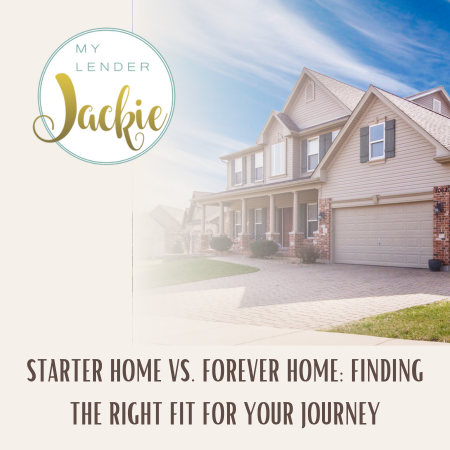One of the challenges buyers run into when narrowing their house hunting search is deciding between a starter home and a forever home. Ultimately, the decision usually comes down to balancing finances, immediate needs, and long term goals. If you’re getting ready to apply for a mortgage, we will be able to help you get real numbers to work with and begin to better understand the financial scenarios associated with a starter home versus a forever home. In the meantime, keep reading for some things you should keep in mind as you decide what type of home to buy.
What is a starter home?

Pros of a Starter Home:
- Starter homes generally cost less than larger, more luxurious properties, so they are ideal for first time buyers just trying to become a homeowner or anyone with a limited budget. You don’t technically need to be buying your first home to buy a starter home. It can also be your “start over home.”
- Owning a home allows you to build equity over time, which can be used to upgrade to a forever home later. Many starter homes offer the opportunity to accelerate this process by doing some home improvements that boost resale value.
- Starter homes provide flexibility. If your long-term plans are uncertain—such as where you want to live or how much space you’ll need—a starter home offers the chance to explore those possibilities without committing to a lifelong investment.
Cons of a Starter Home:
- Starter homes are often smaller and may lack features like additional bedrooms, outdoor space, or modern upgrades. By definition, they aren’t your dream home and won’t check every wish list box.
- Depending on market conditions, you may face difficulties selling your starter home when it’s time to upgrade. There is an element of risk if your plan is to buy it and quickly sell in a couple of years.
- Because they’re viewed as transitional, you may outgrow a starter home faster than you anticipated.
What is a forever home?
A forever home is a property you plan to stay in for the long haul, designed to meet your needs now and in the future. These homes are often larger, but might just have the features and finishes of your dream home even if they aren’t much bigger. With features that accommodate growing families, retirement plans, or specific lifestyle preferences, these are the kinds of properties you dream about owning. Forever homes represent a long-term commitment, offering the chance to truly make the space your own.
Pros of a Forever Home:
- Forever homes represent stability. A forever home provides the comfort of knowing you won’t have to move frequently.
- Because you’re planning to stay for the long term, a forever home can be tailored to your preferences.
- A forever home is a special purchase because you get to start making memories and traditions in a property that will be in the family for many years or decades.
- These homes often include features to accommodate future needs, such as additional bedrooms, home offices, or aging-in-place design elements.
Cons of a Forever Home:
- Forever homes typically require a larger upfront investment, from down payments to ongoing maintenance expenses. Simply put, for many buyers it’s not financially possible to buy a forever home for many years after initially becoming a homeowner.
- A forever home is a long term commitment. If your circumstances or preferences change, it may be harder to adapt or sell a forever home.
- Jumping straight into a forever home may mean waiting longer to save enough money or qualify for a larger mortgage.
Deciding What’s Right for You
For many, the decision between a starter home and a forever home comes down to balancing immediate needs with future aspirations. Here are some scenarios to help guide your choice:
- Choose a Starter Home If:
- You’re eager to stop renting and start building equity.
- Your long-term plans are uncertain, such as where you’ll live or how much space you’ll need.
- You’re working within a tight budget or prefer a lower-cost entry into homeownership.
- Choose a Forever Home If:
- You’re financially ready to invest in a larger property.
- You’ve found a location and home features that fit your long-term vision.
- You value stability and want to minimize future moves.
One of the key pieces of information you need to make this decision is what you can qualify to borrow. We can help you look at different loan options and find out what your budget might be to get you one step closer to your goals in real estate.
Ready to learn more about finding the right financing for your home? Contact us any time to get started.

